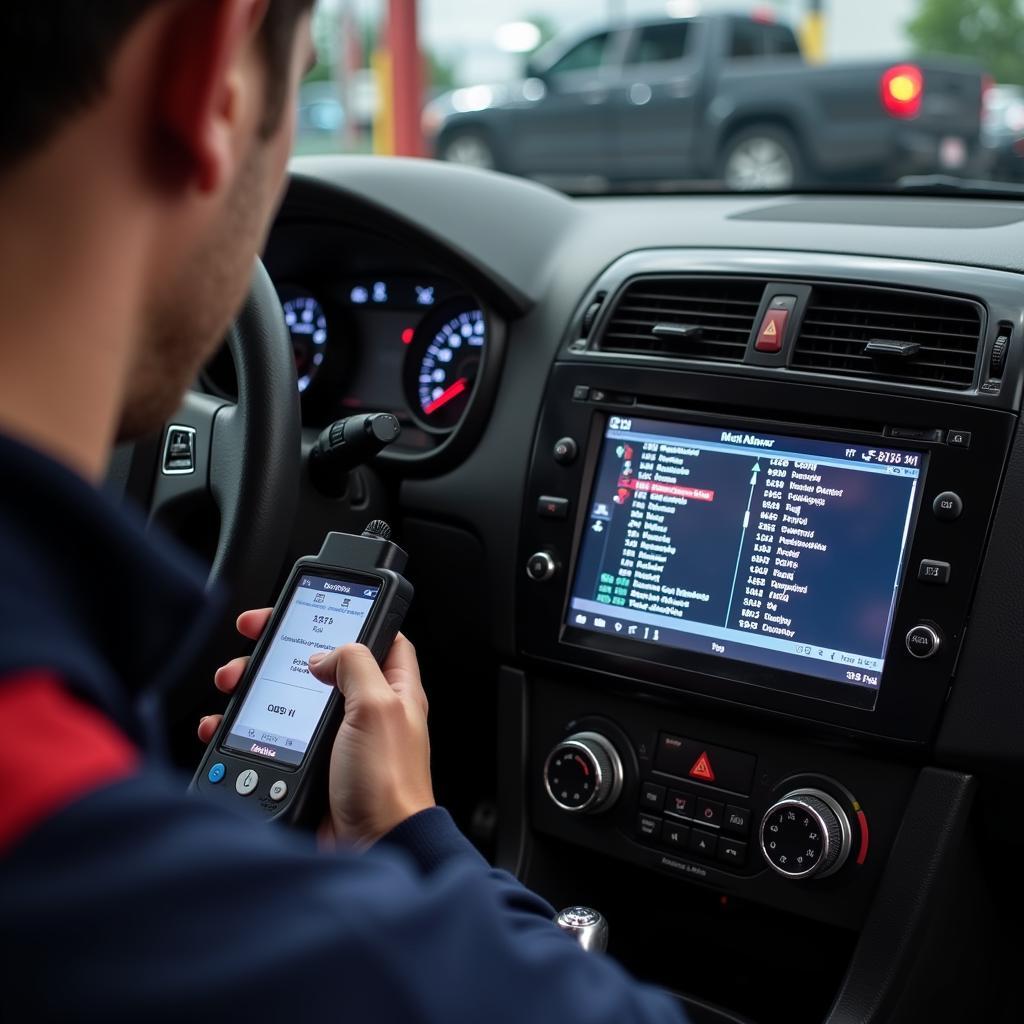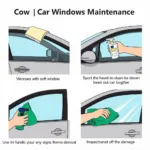Car inspection and diagnostic check are crucial for maintaining your vehicle’s health, ensuring safety, and preventing costly repairs down the road. Understanding these processes can empower you to make informed decisions about your car’s maintenance and avoid potential problems.
Why are Car Inspection and Diagnostic Checks Important?
Regular car inspections and diagnostic checks can identify potential issues before they become major problems. This proactive approach can save you money, time, and even prevent dangerous situations on the road. A thorough inspection goes beyond just checking the fluids; it involves a comprehensive assessment of various systems, including the engine, brakes, suspension, and electrical components. A diagnostic check, on the other hand, dives deeper into the car’s computer system to pinpoint specific issues that might not be readily apparent during a visual inspection.
Think of it like this: regular checkups with your doctor can help catch health problems early on. The same principle applies to your car. Early detection through car inspection and diagnostic checks can prevent small issues from escalating into expensive repairs or even complete breakdowns.
After a complete check-up, you might be interested in a fixed car diagnostic. You can find more information on our website.
What Does a Car Inspection Involve?
A typical car inspection covers a wide range of components and systems. Here’s a general overview:
- Visual Inspection: Checking for any visible signs of damage, wear, or leaks.
- Fluid Check: Examining the levels and condition of essential fluids like engine oil, coolant, brake fluid, power steering fluid, and transmission fluid.
- Brake Inspection: Assessing the condition of brake pads, rotors, and lines.
- Tire Inspection: Checking tire pressure, tread depth, and overall condition.
- Steering and Suspension Check: Evaluating the functionality and integrity of steering components and suspension system.
- Lights and Electrical System Check: Verifying the proper operation of headlights, taillights, turn signals, and other electrical components.
- Exhaust System Check: Inspecting for leaks, damage, and proper emissions.
What Does a Diagnostic Check Entail?
A diagnostic check utilizes specialized equipment to access the car’s onboard computer system. This system stores diagnostic trouble codes (DTCs) that indicate specific malfunctions. A diagnostic scan retrieves these codes, providing valuable insights into the root cause of various issues.
- Retrieving DTCs: Identifying specific fault codes stored in the car’s computer.
- Analyzing Data: Interpreting the retrieved codes to pinpoint the source of the problem.
- Testing Components: Performing targeted tests to confirm the diagnosis.
- Resetting Systems: Clearing the DTCs after repairs are completed.
You can learn more about specific car electrical diagnostic services near you through our dedicated page.
When Should You Get a Car Inspection and Diagnostic Check?
While regular maintenance schedules provide a good guideline, several situations warrant a car inspection and diagnostic check:
- Warning Lights: If any warning lights illuminate on your dashboard, such as the check engine light, it’s essential to get a diagnostic check immediately.
- Unusual Noises or Vibrations: Any strange sounds or vibrations from your car could indicate underlying problems.
- Performance Issues: If your car experiences a sudden drop in performance, such as reduced power or decreased fuel efficiency, a diagnostic check can help identify the cause.
- Before Buying a Used Car: A pre-purchase inspection and diagnostic check are crucial when considering a used car to avoid potential hidden problems.
- After an Accident: Even seemingly minor accidents can cause hidden damage that requires a thorough inspection.
“Regular car inspections and diagnostic checks are an investment, not an expense,” says John Smith, Senior Automotive Technician at Smith Auto Repair. “They can save you from costly repairs in the long run and ensure your safety on the road.”
What are the benefits of a car diagnostic report template?
Using a car diagnostic report template can streamline the process and ensure consistency in documenting the findings. Learn more about creating a car diagnostic report template on our website. You can also find information about low impulsive value on car diagnostics if you’re experiencing unusual readings during your diagnostic check.
Conclusion
Car inspection and diagnostic check are vital for maintaining your vehicle’s health, safety, and longevity. By understanding these processes and their importance, you can make informed decisions about your car’s maintenance and prevent costly repairs. Regular checks are an investment that can save you money and ensure safe and reliable driving.
FAQ
- How often should I get a car inspection?
- What is the difference between a car inspection and a diagnostic check?
- How much does a car diagnostic check cost?
- What is a diagnostic trouble code (DTC)?
- Can I perform a diagnostic check myself?
- What should I do if my check engine light comes on?
- How can I find a reliable mechanic for a car inspection and diagnostic check?
Common Car Diagnostic Scenarios:
- Check Engine Light On: This could indicate various issues, from a loose gas cap to a more serious engine problem. A diagnostic check is necessary to pinpoint the cause.
- Car Won’t Start: This could be due to a dead battery, a faulty starter, or other electrical issues. A diagnostic check can help identify the source of the problem.
- Poor Fuel Economy: Several factors can contribute to poor fuel economy, such as clogged fuel injectors or a malfunctioning oxygen sensor. A diagnostic check can help identify the underlying cause.
Further Resources:
For more information about car radio diagnostics using specific tools like Delphi, check out our guide on how to diagnostic car radio with Delphi.
If you need assistance with your car’s diagnostics or repairs, please contact us via WhatsApp: +1(641)206-8880, or Email: [email protected]. Our 24/7 customer support team is always ready to help.



